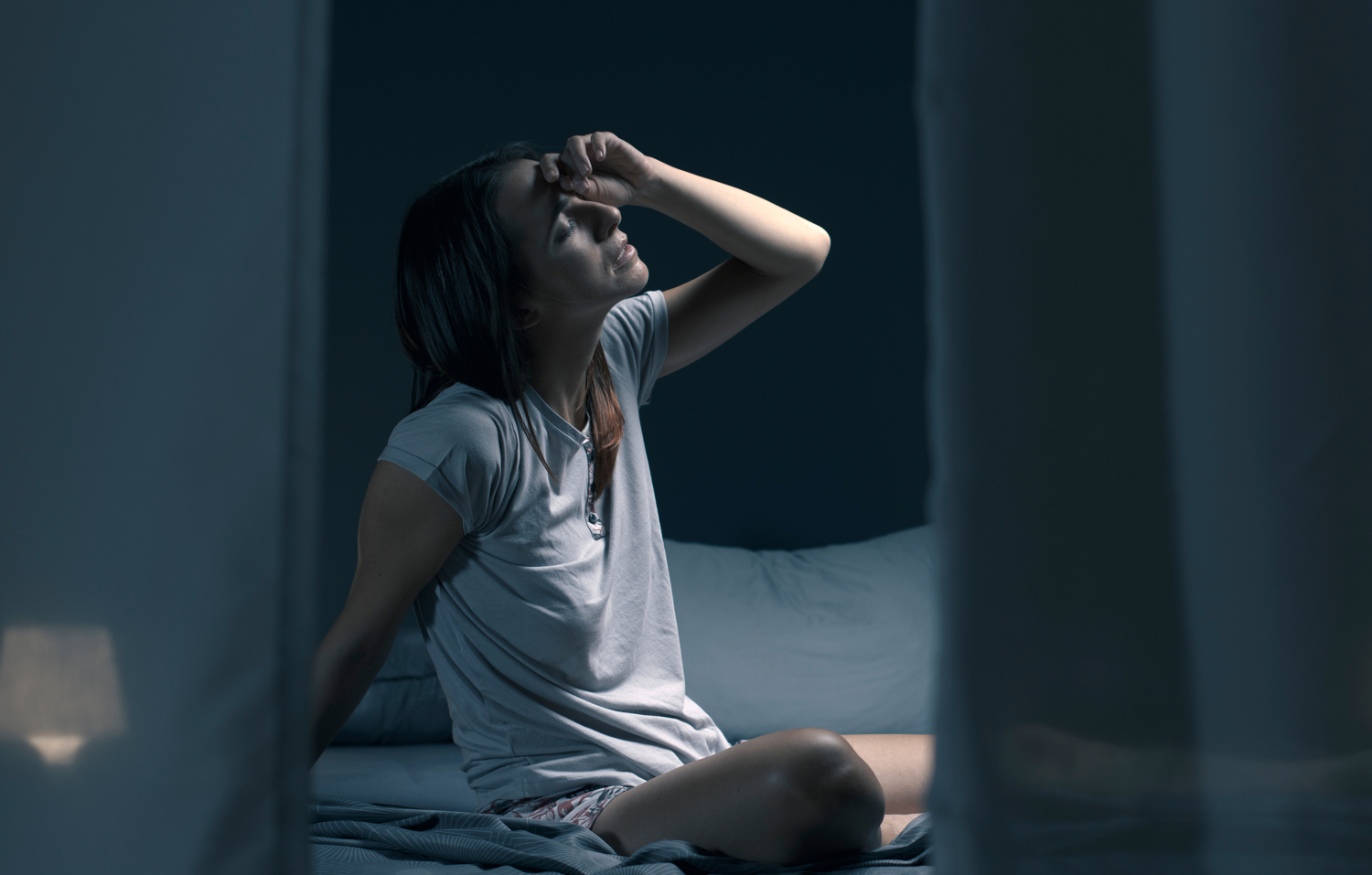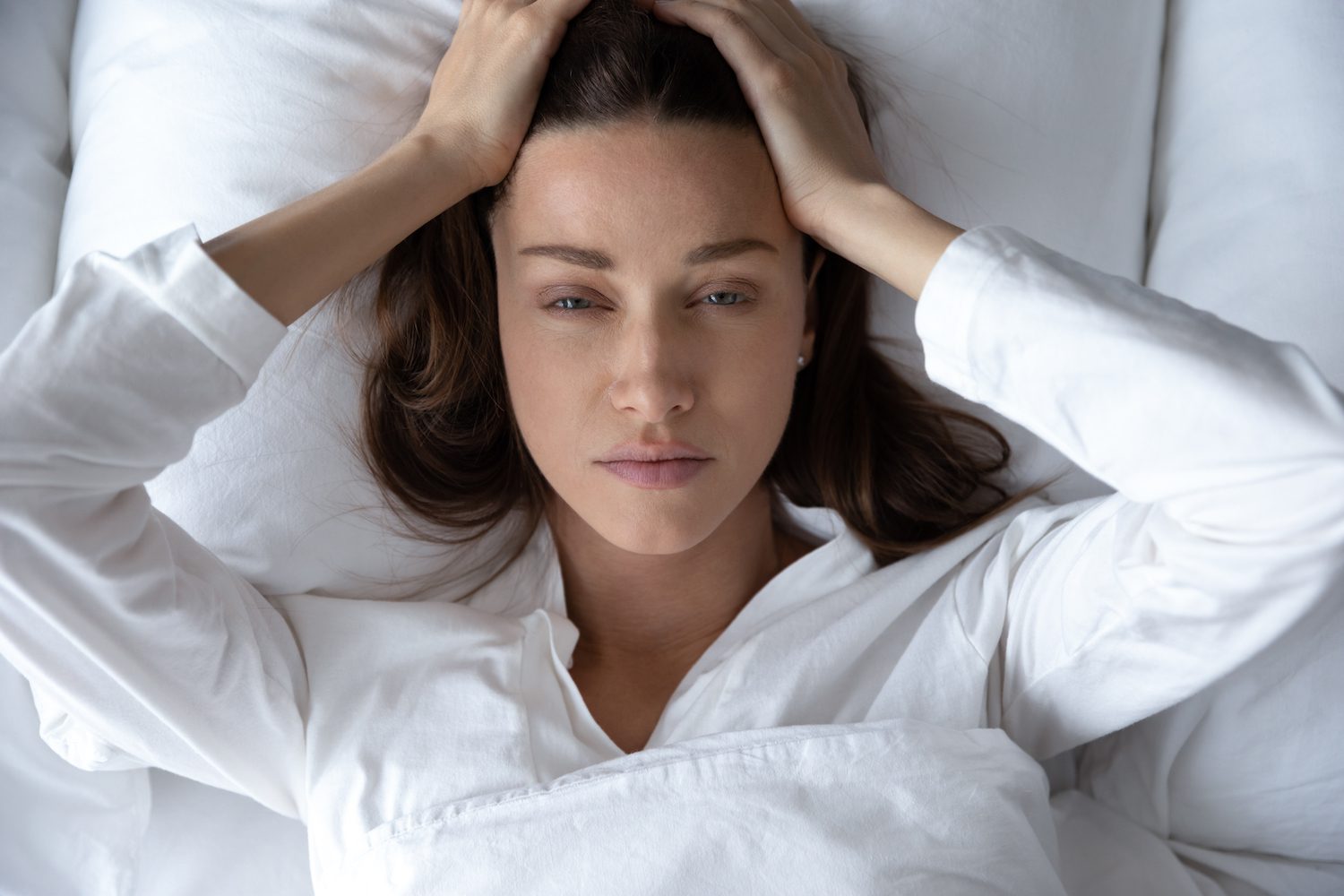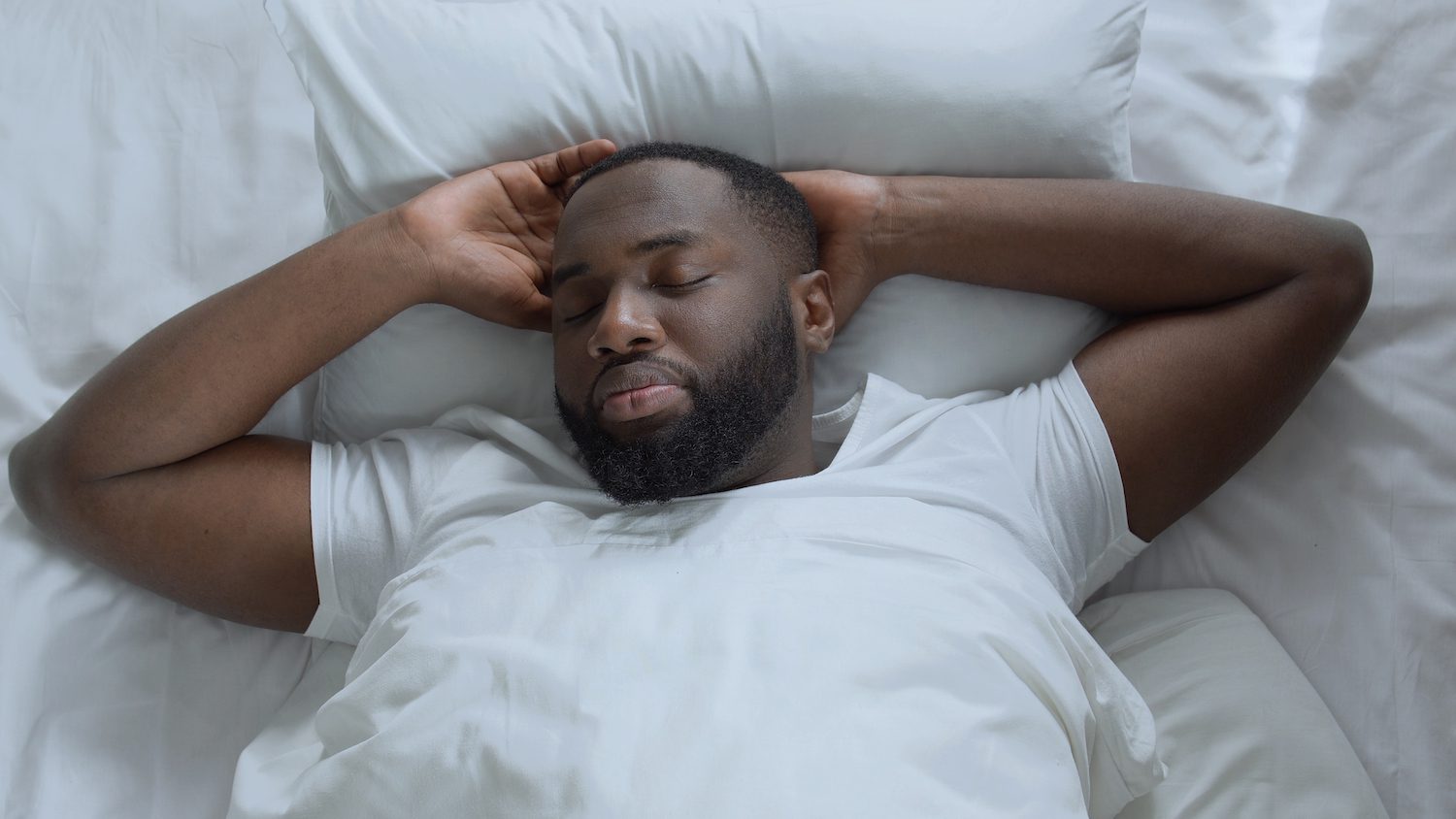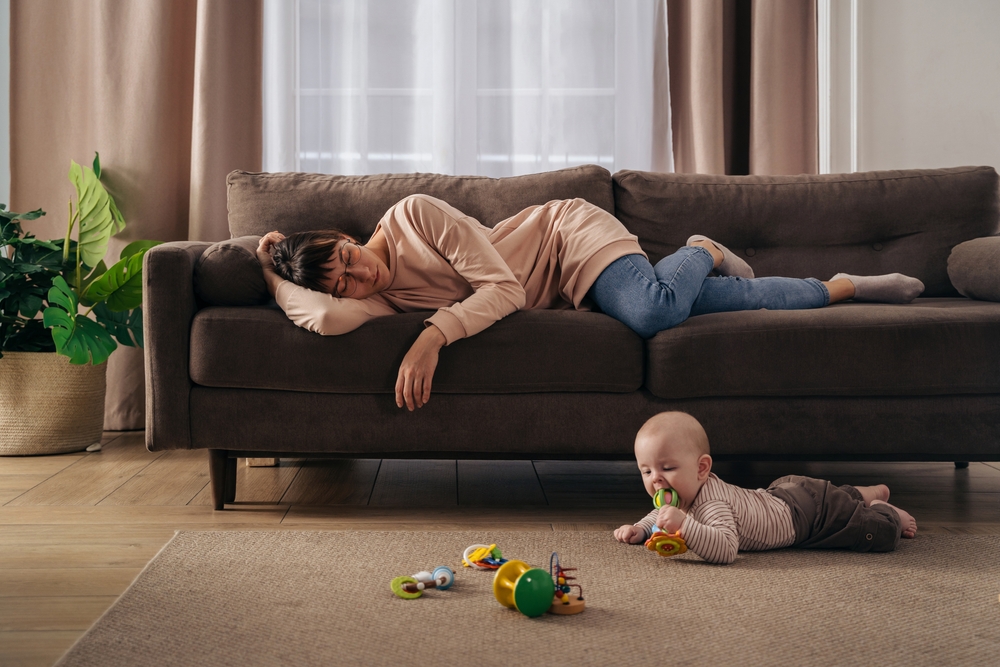When you buy through our links, we may earn a commission. Products or services may be offered by an affiliated entity. Learn more.
Night Sweats
At a Glance
The term “night sweats” refers to the experience of sweating excessively while sleeping at night. In severe instances, a person may even wake up to find their pajamas or bedding soaking wet from sweat. Common causes of night sweats include menopause and other hormonal changes, fever and infection, overactive thyroid, anxiety, medication side effects, and certain medical conditions.
Overview of Night Sweats
Night sweats refer to episodes of excessive sweating during sleep that go beyond simply feeling warm under the covers. Unlike mild perspiration from an overheated bedroom or too many blankets, night sweats can be severe enough to drench your pajamas and sheets, often waking you up in the middle of the night soaked in sweat.
What sets night sweats apart is that they persist even in a cool, comfortable sleeping environment. They’re usually not caused by external temperature but by internal factors, such as hormonal shifts, infections, or medical conditions.
Common symptoms of night sweats include:
- Waking up in damp or soaked clothing and bedding
- Feeling cold or chilled after the sweating stops
- Difficulty falling back asleep due to discomfort
- Repeated episodes throughout the night
Some research suggests up to 40% of people who visit their primary care doctors report experiencing night sweats, with people in their 40s and 50s affected most . Night sweats can be harmless and occasional—or they can signal an underlying health issue that needs attention.
Looking to improve your sleep? Try upgrading your mattress.
Common Causes of Night Sweats
Sweating at night occurs for a variety of reasons, including heavy bedding or running a fever. Most people who sweat at night likely don’t have a serious underlying medical issue, especially if their night sweats are mild, happen less frequently, and don’t accompany daytime symptoms.
That said, sometimes there’s an underlying health explanation for night sweats. Suddenly sweating at night can be the first sign of a health issue and a visit to your doctor can help you rule out the following possibilities.
How to Prevent Night Sweats
The remedy to night sweats—and preventing future episodes—hinges on what’s driving them in the first place. Depending on the cause, these strategies may help you stay comfortable and cooler at night.
Lifestyle Changes
A few simple changes to your daily routine can make a big difference when it comes to nixing night sweats.
- Avoid triggers: Limit alcohol, caffeine, and spicy foods before bed, as they can raise body temperature and lead to night sweats.
- Get regular exercise: Physical activity during the day can help regulate body temperature. Just don’texercise immediately before bed, as it can elevate your core body temperature.
- Manage stress: Unwind before bedtime using deep breathing, meditation, and relaxation techniques. These practices can all reduce stress and anxiety, which can trigger night sweats.
- Drink plenty of water: Staying hydrated during the day can help control body temperature. You can also sip cool water throughout the night. Just keep in mind you might need to make more bathroom trips.
Sleep Hygiene Tips
If you’ve been waking up at night in a sweat, evaluate your sleep environment. Often, making small changes to your space can optimize it for sleep.
- Keep a cool bedroom: The ideal environment for sleep should be cool, ideally between 60 and 68 degrees Fahrenheit. Use a bedroom fan, sleep with your windows open, or crank up the air conditioning to keep the room’s temperature in this range.
- Choose breathable bedding: Wear loose-fitting, lightweight, cotton or linen pajamas to bed. These airy, breathable fabrics can help you stay cool and dry by wicking away moisture. Likewise, use lightweight, layered bedding that you can remove if you feel too warm.
- Use cooling products: Try pillows and mattress covers that contain cooling gels. You can even keep a cold pack under your pillow, then flip your pillow to rest your head on a cool surface.
Medical Treatments
If you have a health condition that’s causing night sweats, you may need more than home remedies and lifestyle changes to resolve the issue. First, consult with your medical provider. They can properly assess you, identify any underlying medical disorders, and target your treatment accordingly. Treatment for night sweats may look like:
- Hormone therapy (for menopause)
- Antibiotics (for infections)
- Thyroid medications (for thyroid disorders)
Likewise, if you’re taking medication for a medical condition that’s causing night sweats, your doctor can also make adjustments to the dosage or prescribe an alternative drug. In many cases, night sweats will subside once you address the root cause of the problem.
When to See a Doctor
If you experience night sweats on a regular basis and know they are not the result of your bedroom temperature or bedding, see a doctor for evaluation, particularly if any of the following apply to you:
- Night sweats happen frequently or don’t go away.
- You also have a fever, chills, or unexplained weight loss.
- You’re waking up drenched and unable to sleep through the night.
- You have other new or worsening symptoms (like fatigue, cough, or pain).
- You’re over age 50 and experiencing new night sweats.
- You take medication that could be causing the sweating.
- You have a known medical condition and symptoms have changed.
Night sweats have many possible causes, including some serious medical causes, and a doctor can ask the right questions to determine the best course of action. Once they’ve assessed your medical history, they can recommend relevant tests and treatment.
Many people who experience night sweats have no underlying health problem. That said, it’s still important to be evaluated in order to rule them out.
Frequently Asked Questions
Are night sweats normal?
Occasional night sweats can be completely normal, especially if your bedroom is warm or you’re using heavy blankets. However, frequent or intense night sweats that aren’t caused by your environment may signal an underlying health issue and should be discussed with a doctor.
Can dehydration cause night sweats?
Possibly. Water helps control body temperature by circulating heat to the skin’s surface and cooling the body with sweat. If you don’t drink enough water during the day, your body may struggle to regulate your temperature at night. Consequently, dehydration can lead to a rise in body temperature, which sets off sweating.
Conversely, night sweats can also contribute to dehydration, especially if they’re frequent or severe. Thus, going to bed while dehydrated could possibly produce a vicious cycle in which low water levels trigger night sweats and night sweats intensify dehydration.
If you’re sweating heavily at night, it’s important to stay hydrated and talk to a healthcare provider to find out what’s causing it.
Do men get night sweats, too?
Yes, men can experience night sweats, too. While hormonal changes during menopause are a common cause in women, men may have night sweats due to low testosterone, infections, sleep disorders, or other medical conditions. Some men have hot flashes and excessive sweating related to hypogonadism, a condition that occurs when the testes don’t produce enough testosterone.
Are night sweats a sign of cancer?
Night sweats can sometimes be a symptom of certain cancers—most notably lymphoma. However, cancer is only one of many possible causes. If night sweats are accompanied by unexplained weight loss, persistent fever, or fatigue, it’s important to see a doctor for evaluation.

Still have questions? Ask our community!
Join our Sleep Care Community — a trusted hub of sleep health professionals, product specialists, and people just like you. Whether you need expert sleep advice for your insomnia or you’re searching for the perfect mattress, we’ve got you covered. Get personalized guidance from the experts who know sleep best.
References
2 Sources
-
Bryce C. (2020). Persistent night sweats: Diagnostic evaluation. American Family Physician, 102(7), 427–433.
https://pubmed.ncbi.nlm.nih.gov/32996756/ -
Smetana, G. (2024 January). Evaluation of the patient with night sweats or generalized hyperhidrosis. In M. Aronson & J. Givens (Ed.). UpToDate.
https://www.uptodate.com/contents/evaluation-of-the-patient-with-night-sweats-or-generalized-hyperhidrosis







